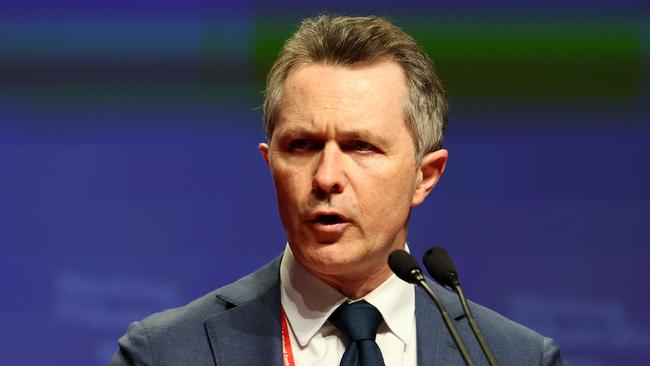Teachers to earn as they learn in apprentice-style training shake-up
Federal Education Minister Jason Clare pins Australia’s teaching crisis on substandard university degrees as he champions an overhaul of the current system.

Trainee teachers will be paid up to $1000 a week to learn on the job in classrooms, in a practical shake-up of university degrees championed by federal Education Minister Jason Clare.
Mr Clare said “placement poverty’’ during unpaid practicum placements was contributing to the 50 per cent dropout rate from teaching degrees, aggravating the crippling shortage of school teachers.
He flagged taxpayer-funded placements for university students in teaching or nursing degrees to earn as they learn on-the-job in schools and hospitals.
“If you’re at uni and live out of home, you need a part time job, and you can’t do that job if you’re spending a lot of your time doing prac at a hospital or working at a school,’’ he told The Weekend Australian.
“This is one of the things that can contribute to people dropping out at a time when we need more nurses, we need more teachers, we need more early educators.’’

The paid placements for teachers and nurses – to be finalised through the Universities Accord process – are likely to be modelled on the $1059 per week payment to childcare educators, which will be offered to 6000 students over four years.
Students enrolled in a childcare certificate, diploma or early childhood teaching degree can apply for the payment for up to four weeks, depending on course requirements.
Next year, Victoria will introduce an apprentice-style teaching program for university graduates with a bachelor’s degree to retrain as teachers, by paying them as teacher aides earning about $60,000 a year while they study a master’s degree in education part-time.
The Australian Education Union (AEU) yesterday threw its support behind paid practicums, warning that poor university training is adding to pressure on burnt-out teachers.
AEU president Correna Haythorpe said some universities had failed to prepare young teachers for classrooms.
“A lot of new educators are saying they don’t feel ITE (initial teacher education) programs prepared them well for the classroom in terms of student behaviour and teaching students with complex needs,’’ she said.
“We then get people not finishing their degrees, dropping out halfway through, or not staying in teaching beyond three to five years.
“We’re calling for more funded practicums for students who have to give up jobs to do their practicum, and to pay the costs of relocation.’’
Mr Clare will force universities to teach “core content’’, including the teaching of reading and classroom management, under reforms signed off by state and territory ministers that will come into force in 2025.
“A lot of teachers tell me that when they started, they really didn’t feel ready for the classroom,’’ Mr Clare said yesterday.
“(They told me) that the uni course didn’t give them everything they needed to know, that the prac wasn’t up to scratch.
“That’s why we’re making changes to what’s taught at uni, to make sure teaching students are taught the fundamentals about how to teach children to read and write and how to manage disruptive classrooms.’’
The federal government will soon open applications for new Commonwealth teacher scholarships worth $40,000 each.
In return, students must commit to teaching for at least four years.
Early applications to enrol in teaching degrees next year have plunged 17 per cent in NSW, the biggest schooling system, with just 2998 applications lodged through the University Admissions Centre compared to 3508 at the same time last year.
Applications are steady in Victoria, which recently announced scholarships to cover the full cost of a secondary teaching degree from 2024.
The Victorian Tertiary Admissions Centre has received 5767 early applications for teaching degrees, slightly more than the 5693 last year.
Federal Opposition education spokeswoman Senator Sarah Henderson blamed “substandard’’ degrees for the teaching workforce crisis.
“It is no wonder that so many teachers feel ill-equipped in the classroom and are leaving the profession in droves,” she said.
Senator Henderson called on the federal government to mandate the use of explicit instruction – a back-to-basics and methodical teaching style – in every school.
The Australian Education Research Organisation (AERO), which was set up by the nation’s education ministers, has called for explicit instruction, better classroom management and the use of phonics to teach reading.
AERO chief executive Dr Jenny Donovan said universities must ensure teachers know how to teach children to read and write, and to keep students’ attention in class.
“It’s clear that too many teachers are emerging without the skills that they need to … ensure effective learning outcomes,’’ she told a Senate estimates hearing on Thursday night.
“That’s why we see some teachers leaving in the first few years of their work.’’
###



